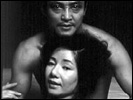Vengeance Is Mine
- Year
- 1979
- Original title
- Fukushu Suru wa Ware ni Ari
- Japanese title
- 復讐するは我にあり
- Director
- Cast
- Running time
- 140 minutes
- Published
- 22 January 2006



by Jasper Sharp
After the costly failure of Profound Desires of the Gods for Nikkatsu, Shohei Imamura moved to the documentary format for a string of productions that include History of Postwar Japan As Told By a Bar Hostess, and the television works In Search of Unreturned Soldiers (pts 1 and 2) and Karayuki-san. Ten years later he was back with his next fiction feature, and his first film to be widely distributed abroad.
Scripted by Masaru Baba (best known for Masahiro Shinoda's Pale Flower), and based on a true-life story documented by Ryuzo Saki of a cold-blooded sociopath who for 78 days roamed across Japan conducting a string of ghastly murders, the movie begins in 1964 amid flurries of snow as a trail of squad cars crawls up a mountain road, bringing the newly captured killer, Iwao Enokizu (Ogata) in for questioning. The back-story unfolds within a compelling procedural narrative as the police draw out the truth of what happened, both through his confessions and the reconstructed testimonies of his family members, retracing his past in an attempt to discover what made this monster.
Considering its sensationalistic subject, Imamura makes no attempt at siding with either killer or victim. By exploring his own ongoing interest in the problems inherent with reconstructing real-life events within a fictional format, the director once again proves himself ahead of the game in terms of the impassive, morally-ambivalent approach that would lie at the heart of later works like John McNaughton's Henry: Portrait of a Serial Killer (1986). This is not a thriller in which cinematic devices are foregrounded to implicate the viewer. The murders mainly occur within the first quarter, and when they are portrayed, it is with a cold, documentary-like objectivity (including onscreen text informing the viewer of the victim's background) that makes them all the more grueling. The viewer remains merely passive witnesses to this cold, brutal world.
Nor does the movie make any facile attempts at explaining why Iwao is the way he is. The only child of a family forced to move to the spa town of Beppu to run an inn after being hounded from their hometown in the pre-war years due to their Catholic faith, he is already a hell-raising loose cannon by the time he hits his teens. His murders are motivated by easy money rather than sex, and his familiarity with his victims allows him to strike without warning.
As with his earlier Intentions of Murder, Imamura offers us glimpses of larger societal dysfunctional by way of dysfunctional family structures. Hints are given in the form of an unconsummated affair (onscreen at least) between Iwao's bullish father Shizuo (Mikuni) and his wife Kazuko (Baisho), which begins during an early spell in prison for fraud. Shizuo is also shown killing a dog by burying it up to its neck and pouring boiling water over its head.
Upon Iwao's return, this claustrophobic family unit seems like a pressure cooker ready to explode as Shizuo struggles to keep it intact, and so Iwao severs his ties, traveling across the country masquerading as both university professor and lawyer, leaving Kazuko behind with his family and a trail of corpses behind him stretching from Kyushu to Hokkaido.
Neither does the inn-cum-brothel run by Haru (Ogawa), who offers shelter to the wanted man, seem any more like a haven of domesticity, with her shrewish mother Hisano (Kiyokawa) spying on the guests, having already served 15 years for her own part in a murder.
An expansive film, both in its length and the wide variety of landscapes in which the story unfolds, Imamura paints a very vivid picture of the country's more savage hidden side, though ultimately the film owes much to the imposing presence of the angular-featured Ogata, playing the despicable charmer capable of unpredictable explosions of irrational brutality.
Eureka's UK DVD release of the film is well up to the usual standards set by Humanity and Paper Balloons, The Face of Another et al, featuring two insightful complementary essays and a full-length commentary track from Tony Rayns. All add up to make this one of the most important recent DVD releases of a Japanese film.